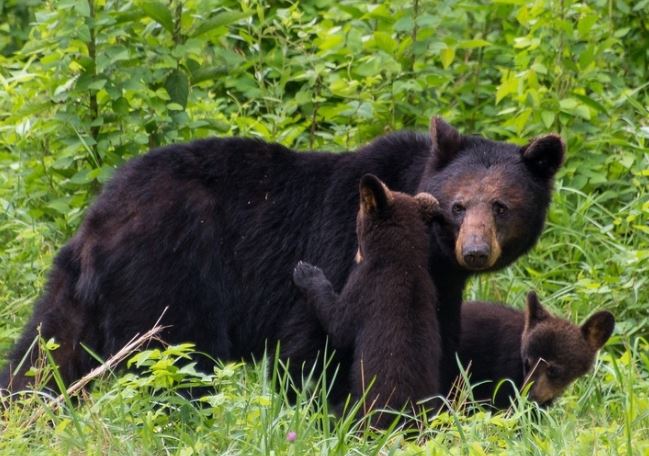Buncombe County bears are on the move, looking for food before winter sets in. The City of Asheville would like to remind our residents to be aware of their surroundings and know what to do if they encounter a bear in an urban setting.
Because a bear recently attacked a Swannanoa woman, N.C. Wildlife Commission staff trapped the adult bear and cubs and euthanized the mother bear. The woman who was attacked did not receive life-threatening injuries, but because of the bear’s behavior towards the woman, the decision was made to euthanize the bear to protect human safety and to keep the cubs from learning her behavior. The bear cubs were healthy and old enough to be independent so they were relocated to a remote area.
This is an extremely rare occurrence.
In this case the bear was feeding on trash nearby and perceived the woman and her dog as a threat to her cubs.
Despite this incident, black bears rarely become aggressive when encountering people and attacks on humans are very uncommon. However, encounters between people and bears are becoming more numerous as more people move into areas where black bears live.
If you encounter a bear
The N.C. Wildlife Commission provides these “bear wise” tips on what to do if encountering a bear:
- Do not approach the bear. Quietly move away and leave the area.
- If you are a safe distance away from the bear, make loud noises, shout, or bang pots and pans together to scare it away.
- Give the bear a clear escape route.
Help deter bears by not providing food sources
Problem bears are rare in the City of Asheville. But a scarcity of food this season may prompt bears to seek out food sources in residential areas.
“Because of all the heavy rains earlier this year, there is a substantial lack of natural foods for bears to eat, such as acorns, nuts, berries and other fruits,” said N.C. Wildlife Commission Black Bear Biologist Colleen Olfenbuttel. “This lack of food means bears are getting bolder and going into neighborhoods and other places they may normally avoid seeking food.”
“Unsecured trash cans left out overnight are one of the biggest attractant to bears,” said Olfenbuttel.
Do not place trash/recycling out the night before collection. By City ordinance, carts should be placed at the curb *on the day of pick up* and removed the same day. So roll that trashcan into your garage, if you have one. Put it outside only on the morning of your collection day.
More tips:
- Bird feeders and unattended outdoor trashcans are the biggest culprits. People who intentionally leave out corn or birdseed for bears do the animals and their neighbors a disservice. Unfortunately, feeding bears can cause them to lose their fear of humans and become pests.
- Bears can smell food from miles away. Putting food scraps in the freezer and then placing them in the garbage can on day of pick up (while still frozen) can reduce bear curiosity.
- Pet food can be another source of attraction. Feed Fido or Kitty inside if your property is subject to the occasional wandering bear.
What about bear-resistant trashcans?
While there is no such thing as a “bear-proof” trashcan, there are “bear-resistant” models, according to Asheville Solid Waste Manager Jes Foster.
“A bear-resistant can makes it more difficult or time-consuming for a bear to get what it wants,” she explained. “However, if a bear grows tired of trying to get into a resistant can, it will just move to the next food source that is not resistant, be that another trash can, recycling bin, birdfeeder or grill. The best course of action is to follow best practices for co-existing with bears and minimize food in the trash containers.”
While the City of Asheville has not offered bear-resistant cans in the past, City staff are working with the N.C. Wildlife Resources Commission and the Southeastern Association of Fish and Wildlife Agencies to discuss testing some carts and cart mechanisms that could reduce bear-related issues.
“The Sanitation Department hopes to partner with them on a BearWise Community pilot project in the future,” said Foster.
For more tips on how to live responsibly with bears in your neighborhood, visit bearwise.org.
Find a N.C. Wildlife statement about the Swannanoa bear attack at this link.
